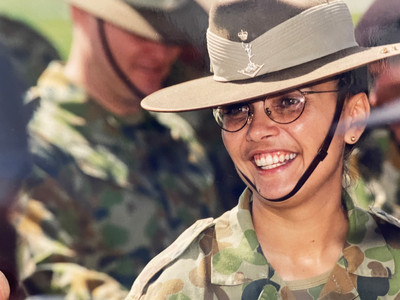Lorraine Hatton OAM
- The Top Ender Magazine
- Jan 28, 2024
- 5 min read
We have searched within the veteran community and found so many amazing leaders who are born to help and inspire others. We recently connected with Lorraine Hatton OAM, who has forged an incredible career in the ADF and continues to drive change for Indigenous communities and veterans through various advocacy roles.
WHAT IS YOUR MILITARY BACKGROUND I enlisted into the Australian Army on 14 Jan 1986, and served for 21 years. I deployed in peacetime and operations, involving peacekeeping, humanitarian, peace-monitoring and war operations, in various theaters and campaigns.
When I enlisted, Army was changing from WRAAC School, which was a different way to embed women into service and it was a bit of a learning curve – we had the same fitness standards as our male comrades, so there were lots of challenges at the start.
I was tired after deploying to Afghanistan and serving for 20 years. There was a lot of change over those years, and I was the first Indigenous Warrant Officer to deploy as a Communications Manager. I needed a break. My original goal was to serve 20 years and that drove me to keep going through the hard times. I was identified by the Australian War Memorial (AWM), as the first Aboriginal female to be promoted to Warrant Officer in the Australian Army’s history. I am extremely proud to have achieved that goal.
I was excited when I left defence, but I struggled a bit after a couple of years of civilian life. It was hard to leave my ‘family’ behind after 21 years, however there are benefits to being a civilian and becoming part of the community.
WHAT INSPIRED YOU TO ENLIST INTO THE ADF?
Before defence, I finished year 10 in 1981, and worked a few odd jobs all around the place. I was looking for job security and originally looked at a career in Policing, but back in 1985, their recruit selection process required year 12 completion, so I switched my focus to a career in defence. I used to be embarrassed to tell this story, but it’s an important part of my decision to enlist: I joined for the stability and financial security that defence provided. Growing up, I was the youngest of 10 siblings, so financial security was important to me, and the Army became an extended family - I felt at home in defence.
In May 2020, I was appointed as the Indigenous Elder for Army, so I continue to visit communities to show kids that it is possible. I was so chuffed to be appointed into this role... I received a letter from Chief of Army, and I was so nervous that I couldn’t open the letter, so I had my husband open it and tell me that I was successful – I really wanted this leadership role and it means so much to me. Through this experience, I hope I have inspired other kids who have grown up within low-income communities as I was able to make a career of it and really enjoyed the diversity of experiences within defence.
DO YOU HAVE FAMILY MEMBERS WHO HAVE ALSO SERVED?
My dad served in WW2 alongside one of my uncles and one of my aunties. A lot of people who served in that generation didn’t speak about it a lot and it’s only later in life that you hear more about it. That’s also true of a lot of modern veterans, but there’s been some great improvements with regards to mental health and it’s now widely supported to be more open and inclusive.
TELL US ABOUT YOUR CULTURAL BACKGROUND AND YOUR ROLE AS A QUANDAMOOKA ELDER
The Quandamooka people live around the Moreton Bay area of South Eastern QLD. I am from North Stradbroke Island / Moreton Island and I sit on various advisory boards. Some of my highlights include:
– II Chaired the QLD Aboriginal and Torres Islander Memorial, which was unveiled in Anzac Square on 27 May 2022 (the first day of Reconciliation Week) in partnership with Griffith University. On the day, we had so many Indigenous veterans in attendance. The square was packed with people, and it was such an emotional day for lots of veterans. You can’t explain that feeling in words – there’s no words to describe the meaning of the memorial.
I currently sit on the board for UniSQ and the Qld Veterans Council
I sit on the Legacy cabinet – we’re in the process of building a new Legacy House next to a veteran's hospital, which will provide housing for families of veterans who are in hospital and looking for support.
I contribute to the Indigenous Advisory Working Group at the AWM in Canberra as the Indigenous Elder of Army.
I am also focused on youth capability building, specifically Indigenous students and young soldiers. I attend AIDP graduations and often bump into some of these students around Army who are proud to share their experiences and journey with me.
WHAT STRATEGIES DO YOU USE TO MANAGE WORK/LIFE BALANCE AND STRESS?
Although I am busy working across a number of projects, I do enjoy the simple life with my family and friends – they keep me grounded. I’m also focused on supporting outcomes and people - there’s so much work to do and sometimes I don’t have the hours or the energy, but I’ve learned to say ‘no’ to some things if I don’t have the capacity to fully commit.
HOW DID YOU FEEL WHEN YOU WERE NOMINATED TO RECEIVE AN OAM?
Extremely honoured - it was overwhelming for me because my OAM also recognises all of the wonderful people who have assisted me throughout life, supported everything I do and shaped who I am... It’s not just about what I have achieved, but many people who helped to guide me.
WHAT DOES INTERNATIONAL WOMEN’S DAY MEAN TO YOU?
My thoughts have changed over the years with the advancement of opportunities for women and the movement changes constantly in society. It’s a day to acknowledge the achievements of women all over the world and the progress we have made, and what we still can achieve. All of these stories are inspiring the young girls of today to be the women of tomorrow - we should pause to celebrate all of what we have achieved.
WHAT SKILLS/LESSONS DID YOU LEARN IN THE MILITARY THAT YOU STILL USE REGULARLY?
There’s a lot of lessons after serving for 21 years! I find that I often put other people before myself and make sound decisions in the face of adversity, especially the ability to stand up and say when something isn’t right. I have also learned open-minded leadership skills with a focus on listening to people of all ages - we need to listen to younger generations as they are our future and help guide them on their journey.
FAVOURITE MUSIC & MOVIE
YOUNG BOY BUDJERAH – it was so inspiring to see him as the opening act for Ed Sheeran.
THE LAST DAUGHTER – a movie about the stolen generation
WHAT IS YOUR FAVOURITE PLACE IN THE TOP END?
I love the Top End because it is so unique and there’s a lot to see. When I was posted to Larrakeyah, I loved walking to the end of barracks by myself and sitting on the rocks to watch the sunset – it was my favourite thing to do. If I was missing family or my life back on North Stradbroke Island, I would go to the coast, immerse myself in country and think about home.
Interviewed by Deb Herring
Committee Member
The Top Ender Magazine












